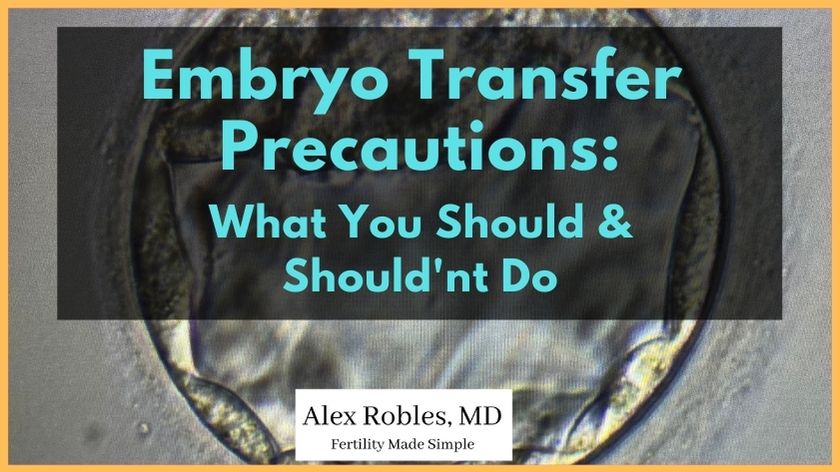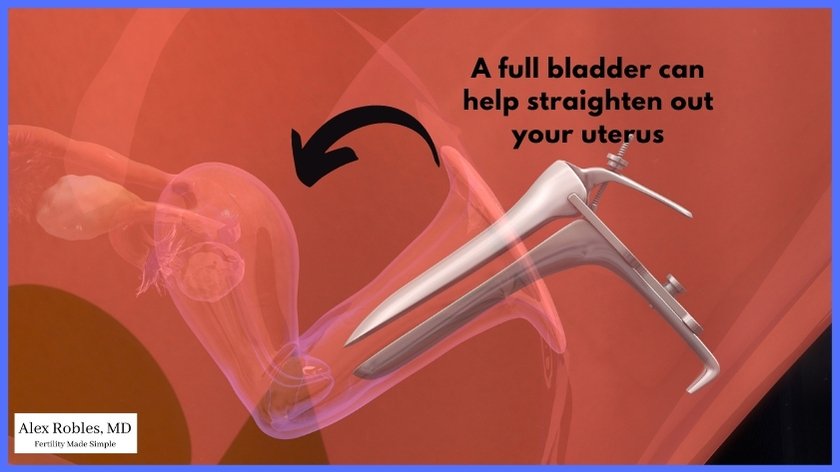Did you just have an embryo transfer or preparing to have one?
You are in the right place.
In this article, you will learn:
- Important precautions you should take after an IVF embryo transfer,
- Things you should do after the procedure, and
- Answers to the most common questions regarding implantation.
Let’s get started.

What should you do leading up to and after your embryo transfer?
There are four things you should do before and after your transfer.
Continue your progesterone
The most important thing for you to do leading up to and after your transfer is to continue taking your medications.
This is especially true for progesterone; (whether it is the vaginal suppository or the intramuscular injection in oil).
This hormone is necessary to maintain your uterine lining and support the growth and development of your pregnancy. The name says it all: Pro= for, gest = gestation.
Be mindful of what you eat
This is not the time to experiment with a new diet. The last thing you want to do is eat anything that doesn’t agree with you or causes you to get sick.
Instead, do your best to eat a well-balanced healthy diet consisting of fruits, vegetables, whole grains, and protein like lean meat or legumes.
Just make sure to wash your produce carefully.
Also try to consume fewer sweets, unhealthy fats, red meats, and alcohol.
Take this important vitamin
Lastly, you should be taking a prenatal vitamin.
Make sure it contains the following ingredients:
- Folic Acid (important for preventing a neural tube defect)
- DHA Omega 3 (important for fetal brain development)
- Vitamin D3 (important for bone development)
- Calcium (important for bone development)
- Iron (important for maintaining blood stores)
The good news is, many prenatal vitamins will have these critical nutrients.
Come with a full bladder
On the day of the embryo transfer, it is important that you come with a relatively full bladder.
Most embryo transfers are done under ultrasound guidance.
This means that an assistant will be performing an abdominal ultrasound while your doctor performs the procedure.
A full bladder will:
- help visualize your uterus better on ultrasound, and
- potentially reposition your uterus so that we can insert the soft catheter into your cavity more easily.

You will get more instructions on the transfer day.
Okay, now let’s talk about some things you should avoid.
What not to do after a transfer
Okay, so you had your transfer. What is the next step?
First and foremost, there are a few things that you should avoid after the procedure.
These include:
- Hot temperatures
- Strict bed rest
- Exposing yourself to chemicals
- Checking a pregnancy test right away
- Sexual intercourse
- NSAIDs
Let’s go over each one by one.
Expose Yourself To Hot temperatures
There is some research to support that elevated temperatures can interfere with implantation.
This is the primary thing that we want you to avoid, which includes things like hot baths, jacuzzis, and saunas.
This is most important in the first 48 hours after the procedure as this is when the embryo implants.
Bed rest
There is no evidence that bed rest has any benefits following an embryo transfer. It could even be harmful. (study 1) (study 2)
In fact, recent studies have shown that bed rest can actually be harmful to you because it can lead to an increased risk of blood clots (aka DVTs). This is especially true following IVF treatment as your estrogen levels are already elevated.
You should still get plenty of rest, but don’t be afraid to walk around and live your normal life.
You do want to avoid any strenuous physical activity though.
Checking a pregnancy test right away
I know you are excited to find out if the transfer was successful.
However, it takes time for the embryo to implant and for the pregnancy to start producing beta hCG, the pregnancy hormone.
At-home pregnancy tests also can’t detect a low but positive hCG level.
It is important that you wait at least ~10 days after the transfer to avoid getting a false negative result and increasing your stress levels.
Trust the process and maintain a positive attitude!
Avoid exposure to chemicals
This one seems like common sense, but there are potentially toxic chemicals in many places.
Data are emerging that certain chemicals can be “endocrine disruptors,” which can alter your body’s hormones.
The most common is Bisphenol A or BPA for short. BPA is found in plastic bottles, cans, and even cash register receipts.
It is also a good idea to avoid other common chemicals like those found in nail polish, hair dyes, paint, cleaning supplies, etc.
Sexual Intercourse
This one is controversial, but many experts recommend avoiding intercourse during the 10-14 day wait. In theory, intercourse can cause uterine contractions, potentially expelling the embryo from the uterus.
It’s probably better to be safe and avoid it for now.
Otherwise, light exercise is okay.
Avoid NSAIDs
Another thing you should potentially avoid is non-steroidal anti-inflammatory medications aka NSAIDs. These include over-the-counter medications such as ibuprofen, Motrin, Advil, Alleve, etc.
NSAIDs can theoretically decrease your uterine blood flow, which could potentially impair embryo implantation.
If you need some mild pain relief, Tylenol / acetaminophen is okay.
How long should you rest after the embryo transfer?
There is no need to rest in the traditional sense after an embryo transfer. You can continue doing your normal activities.
With that said, you should take it easy after the procedure.
Avoid any strenuous activities like heavy lifting, sexual activity, or anything that places a lot of stress on the body for the two-week wait until your pregnancy test.
Complete bed rest is NOT recommended.
What can you do after embryo transfer to increase success?
Aside from continuing your progesterone, staying away from alcohol and other harmful substances, and eating a normal well-balanced diet, there is nothing else for you to do.
You have done everything you can!
It is up to the embryo and the endometrium at this point.
What should I look for after embryo transfer?
There aren’t any specific positive signs to indicate that your transfer was successful.
Similarly, there aren’t any specific negative signs to indicate that your transfer failed either.
You may experience mild cramping a couple of days after the procedure. Spotting isn’t uncommon either.
Neither of these things indicates a positive or a negative sign.
Other Related Questions
Is walking good after an embryo transfer?
There is no evidence that walking will improve your success rate, but walking is good for you in general.
There is no need for you to reduce your regular daily activity level after the procedure.
Just avoid vigorous exercise and drink plenty of water!
Can I climb the stairs?
Yes, you can climb stairs after an embryo transfer.
There is no evidence that climbing stairs following your transfer will adversely affect the outcome.
Again, avoid strenuous activity and make sure to stay well hydrated.
Can I bend?
Yes, you can bend after an embryo transfer. There is no evidence that bending will adversely affect the outcome following your transfer.
If this is in the context of yoga, just make sure to avoid hot yoga!
Is it OK to drink tea or hot water after an embryo transfer?
It is okay to drink tea and hot water after an embryo transfer. The important thing is that you avoid elevating your core body temperature with things like hot tubs and saunas.
What should I eat after the embryo transfer?
You should return to your normal diet after embryo transfer. There is no need for you to make drastic changes to your diet.
Focus on eating a balanced diet that includes lean protein, vegetables, fruit, and healthy fats.
How should I sleep after IVF transfer?
There is no need to change your sleeping position after a transfer. The only time you should sleep in a left lateral position is when you are in the second or third trimester of your pregnancy.
Can I pee after my embryo transfer?
Yes! You can empty your bladder immediately following the embryo transfer procedure. You cannot pee or poop out the embryo after it gets placed in your uterine cavity!
Conclusion
You have come a long way through the IVF process!
To get to this point you have:
- Had an extensive fertility workup
- Possibly undergone an intrauterine insemination (IUI) procedure (or multiple)
- Began daily injections, with frequent ultrasounds, and blood work
- An egg retrieval
- Long waits
- An emotional roller coaster, and
- Now a fresh or frozen embryo transfer
The transfer can very well be the culmination of your IVF cycle!
With that said:
Don’t forget that successful embryo implantation is largely out of your hands at this point.
Just follow these precautions to give yourself the best chance of success for a healthy pregnancy!
Related Posts:
- The Mock Embryo Transfer: When and Why Is It Used?
- Miscarriage Symptoms After Embryo Transfer: What To Look Out For
- When Should You Stop Estrogen & Progesterone After A Transfer? (And Why?)
Make An Appointment With Dr. Robles To Discuss Your Fertility Options Today!

Alex Robles, MD
Dr. Alex Robles is a Spanish-speaking Latino-American Reproductive Endocrinologist and Infertility specialist in New York City, and a board-certified OBGYN. He has a special interest in health, lifestyle, & nutrition. Make an appointment with Dr. Robles to discuss your fertility options today!
